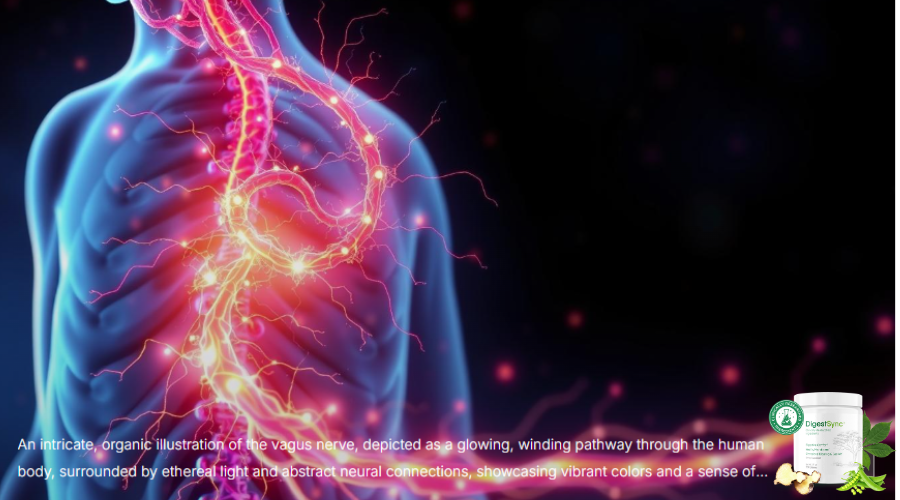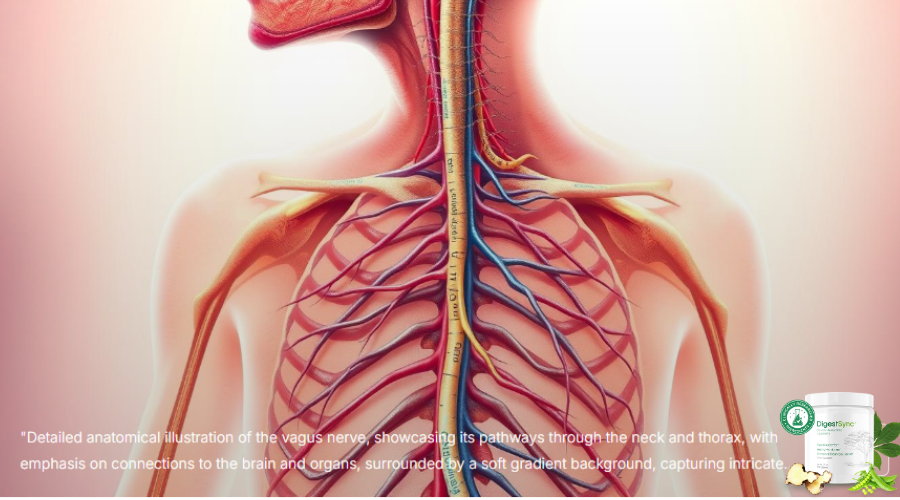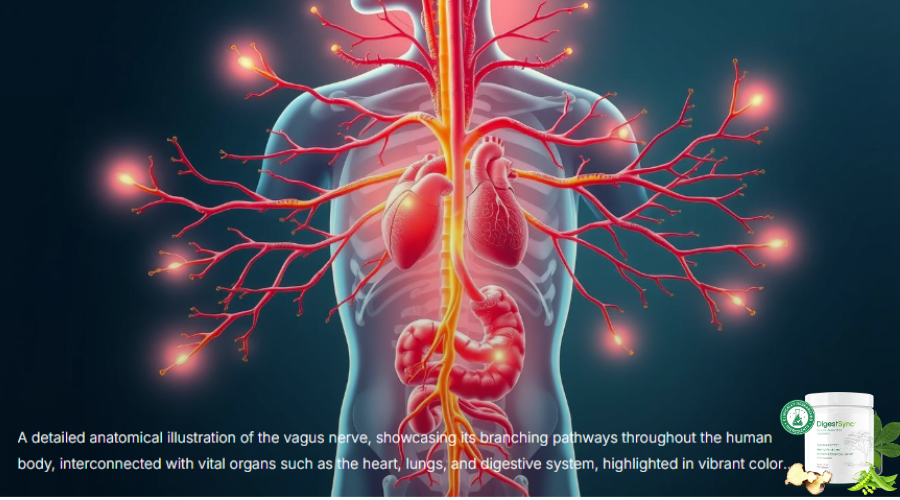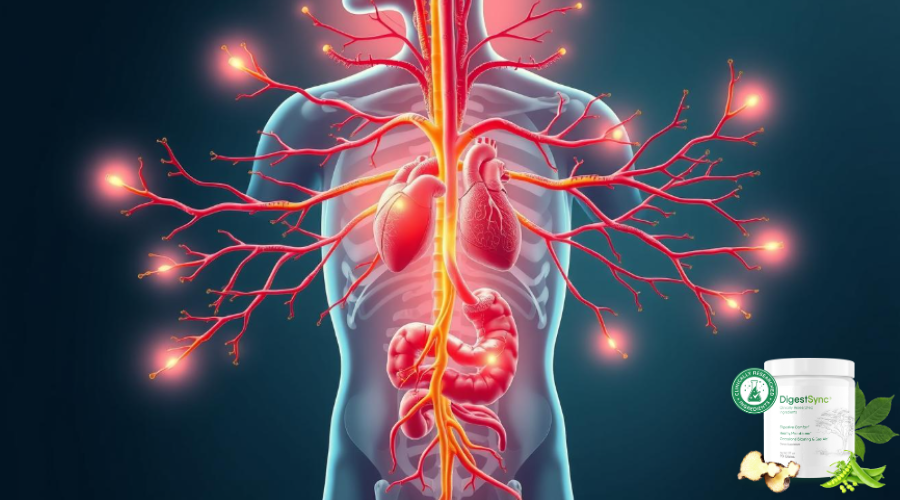Vagus Nerve Stimulation
The vagus nerve, also known as the nervo vago, is a vital part of our body. It acts as the master regulator of many bodily functions. It is the tenth cranial nerve, or nervo craniano x, and is crucial for the sistema nervoso autônomo.
This nerve is key in moving food from the stomach to the intestines. It controls digestion, heart rate, and breathing. These are all vital for our body’s involuntary actions.

An intricate, organic illustration of the vagus nerve, depicted as a glowing, winding pathway through the human body, surrounded by ethereal light and abstract neural connections, showcasing vibrant colors and a sense of dynamic movement.
The nervo vago is essential for our well-being. Knowing its role helps us understand the human body better. The nervo craniano x, or vagus nerve, is vital in the autonomic nervous system. It plays a key role in keeping us healthy.
Key Takeaways
- The vagus nerve, or nervo vago, is a complex component of the human body.
- It plays a key role in the sistema nervoso autônomo, regulating involuntary actions of the body.
- The vagus nerve is responsible for managing the movement of food from the stomach to the intestines.
- It regulates various functions, including digestion, heart rate, and respiratory rate.
- Understanding the functions and importance of the nervo craniano x can help us better appreciate the human body.
- The vagus nerve is essential to maintaining our overall health and well-being.
What is the Vagus Nerve and Why is it Important?
The vagus nerve is key to our health. Knowing its função do nervo vago is vital. It controls digestion, heart rate, and breathing. The importância do nervo vago is huge, as it’s a main part of our autonomic nervous system.
This nerve keeps our digestive system healthy. Its estimulação do nervo vago greatly affects our well-being. Studies show it’s crucial for digestion and its problems can cause health issues.
Definition and Basic Functions
The vagus nerve starts in the brain and goes to many parts of the body. It controls heart rate, blood pressure, and breathing. It’s also key in the autonomic nervous system, which handles our body’s automatic actions.
Role in the Autonomic Nervous System
The vagus nerve is a big part of the autonomic nervous system. It manages heart rate, blood pressure, and digestion. It keeps our body’s functions in balance.
Historical Discovery and Research
For centuries, the vagus nerve has been studied. Its role in health has been understood more lately. The estimulação do nervo vago helps with anxiety and depression.
| Function | Description |
|---|---|
| Regulation of heart rate | The vagus nerve helps to regulate heart rate and maintain a healthy blood pressure. |
| Regulation of digestion | The vagus nerve plays a crucial role in regulating the digestive system and maintaining a healthy gut. |
| Regulation of respiratory rate | The vagus nerve helps to regulate respiratory rate and maintain a healthy breathing pattern. |
Anatomy of the Vagus Nerve
The anatomia do nervo vago is a complex and fascinating topic. The vagus nerve, also known as the tenth cranial nerve, starts in the brainstem. It goes all the way down to the abdomen. This nerve is key in controlling many body functions, like digestion, heart rate, and breathing.
Keeping the vagus nerve healthy is vital for our overall saúde do nervo vago. A healthy vagus nerve helps manage emotions, lowers stress, and boosts well-being. Important parts of the vagus nerve’s anatomy include:
- Origin: The vagus nerve starts in the brainstem, specifically in the medulla oblongata.
- Course: The nerve goes down to the abdomen, passing through the neck and thorax.
- Distribution: The vagus nerve connects to various organs, like the heart, lungs, and digestive tract.

“Detailed anatomical illustration of the vagus nerve, showcasing its pathways through the neck and thorax, with emphasis on connections to the brain and organs, surrounded by a soft gradient background, capturing intricate textures and colors of neural tissue.”
Knowing about the anatomia do nervo vago and its role in saúde do nervo vago helps us take care of our health. It encourages us to promote our overall well-being.
Key Functions and Body Systems Affected
The vagus nerve is key in controlling many body functions. It helps with digestion, heart rate, and breathing. It also affects the immune system and blood pressure. This is all part of the sistema nervoso autônomo, which controls body actions we can’t control.
When it comes to distúrbios do nervo vago, knowing the função do nervo vago is crucial. The vagus nerve is vital for the autonomic nervous system. Its problems can cause many health issues. Some main tasks of the vagus nerve are:
- Regulating the digestive system
- Controlling heart rate and blood pressure
- Modulating the immune system response
- Influencing emotional regulation
Understanding the vagus nerve’s role helps in diagnosing and treating distúrbios do nervo vago. Recognizing the função do nervo vago in the sistema nervoso autônomo is important. It helps keep the vagus nerve healthy and promotes overall well-being.

A detailed anatomical illustration of the vagus nerve, showcasing its branching pathways throughout the human body, interconnected with vital organs such as the heart, lungs, and digestive system, highlighted in vibrant colors to represent its key functions, surrounded by a glowing aura symbolizing communication between the brain and body systems.
| Body System | Vagus Nerve Function |
|---|---|
| Digestive System | Regulates movement of food from stomach to intestines |
| Cardiovascular System | Controls heart rate and blood pressure |
| Immune System | Modulates immune system response |
Common Vagus Nerve Disorders and Symptoms
The vagus nerve can face many disorders and injuries. These can greatly affect our saúde do nervo vago. Disorders like vagus nerve stimulation, damage, and dysfunction are common. They can stem from injuries, infections, or certain health conditions.
Knowing the causes and symptoms of these disorders is key for terapia do nervo vago. Symptoms include trouble swallowing, hoarseness, and shortness of breath. In severe cases, these issues can affect heart rate and blood pressure.
Here are some important points about the vagus nerve and health:
- Vagus nerve disorders can impact digestive health.
- Vagus nerve stimulation helps control heart rate and blood pressure.
- Vagus nerve dysfunction can affect the immune system.
By focusing on saúde do nervo vago and terapia do nervo vago, we can manage distúrbios do nervo vago. This helps improve overall well-being.
| Disorder | Symptoms | Treatment Options |
|---|---|---|
| Vagus Nerve Stimulation | Difficulty swallowing, hoarseness | Medication, therapy |
| Vagus Nerve Damage | Shortness of breath, heart rate issues | Surgery, rehabilitation |
| Vagus Nerve Dysfunction | Immune system response issues | Lifestyle changes, medication |
Natural Ways to Stimulate Your Vagus Nerve
Keeping your vagus nerve healthy is key to feeling good. You can do this with breathing exercises, physical activities, and what you eat. A healthy lifestyle helps keep your saúde do nervo vago in check. This nerve is important for many body functions.
The importância do nervo vago is huge. It controls digestion, heart rate, and how your immune system works. To naturally boost your vagus nerve, try these:
- Deep breathing exercises to reduce stress and anxiety
- Physical activities such as yoga to promote relaxation and balance
- Dietary considerations, including a balanced diet rich in fruits, vegetables, and whole grains
Adding these natural methods to your day can help your vagus nerve. This leads to better health and wellbeing overall.
| Method | Benefits |
|---|---|
| Deep Breathing Exercises | Reduces stress and anxiety, promotes relaxation |
| Physical Activities (Yoga) | Promotes balance, flexibility, and relaxation |
| Dietary Considerations | Supports overall health and wellbeing, promotes healthy digestion |
Conclusion: The Future of Vagal Nerve Research and Therapy
The vagus nerve is key to our health and happiness. Research and therapy for it are getting better. This is because scientists are working hard to understand and treat vagus nerve problems.
Studies show that vagus nerve therapy could help with depression, anxiety, and pain. Methods like vagus nerve stimulation and special breathing exercises are showing great promise. They offer hope for those looking for new ways to feel better.
More people are realizing how important the vagus nerve is. This has led to more focus on keeping it healthy. Things like what we eat and how we move can help keep our vagus nerve in top shape.
As scientists learn more about the vagus nerve, we’ll see even more progress. This knowledge will help doctors and patients improve their health. It will make life better for those dealing with vagus nerve issues.
FAQ
What is the vagus nerve and why is it important?
The vagus nerve is a vital part of our body. It acts as the master controller for many functions. It’s the tenth cranial nerve and is key to the autonomic nervous system.
This system controls actions we do without thinking. The vagus nerve helps with digestion, heart rate, and breathing.
What is the role of the vagus nerve in the autonomic nervous system?
The vagus nerve is vital in the autonomic nervous system. It controls actions we do without thinking. It helps with digestion, heart rate, and breathing.
What is the anatomy of the vagus nerve?
The vagus nerve is the tenth cranial nerve. It starts in the brainstem and goes down to the abdomen. It controls digestion, heart rate, and breathing.
What are the key functions of the vagus nerve?
The vagus nerve is key for digestion. It helps move food from the stomach to the intestines. It also controls heart rate and blood pressure.
It also helps our immune system respond.
What are some common vagus nerve disorders and symptoms?
Common issues include vagus nerve stimulation, damage, and dysfunction. Symptoms include digestive problems, irregular heart rate, and immune issues.
How can I naturally stimulate my vagus nerve?
You can naturally stimulate your vagus nerve. Try breathing exercises, physical activities, and a balanced diet. Deep breathing, yoga, and a healthy lifestyle help keep your vagus nerve healthy.



